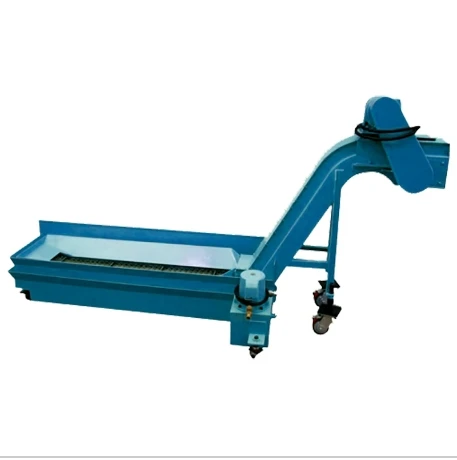chip conveyor
The Evolution and Importance of Chip Conveyors in Modern Manufacturing
In the ever-evolving landscape of manufacturing, the efficient handling and transportation of materials play a crucial role in optimizing production processes. Among the various tools and technologies employed in this realm, chip conveyors have emerged as an essential component, particularly in machining operations. These conveyors are designed specifically for the removal and transportation of metal chips and shavings produced during manufacturing processes, ensuring a clean and safe working environment while enhancing productivity.
What is a Chip Conveyor?
A chip conveyor is a mechanical device that transports metal chips, scrap, coolant, and other byproducts away from machining centers, lathes, milling machines, and other industrial equipment. This functionality helps prevent the accumulation of debris that can lead to equipment malfunctions, unsafe working conditions, and decreased efficiency. Chip conveyors come in various designs, including belt-style, screw-type, and magnetic types, each tailored to specific applications and materials.
Importance of Chip Conveyors in Manufacturing
1. Enhanced Efficiency One of the primary advantages of chip conveyors is their ability to streamline the manufacturing process. By automatically removing waste materials, they minimize downtime associated with manual clean-up tasks. This continuous operation allows machines to run longer and more efficiently, resulting in higher productivity levels.
2. Improved Worker Safety Accumulated metal chips on a shop floor can pose significant safety hazards. Slip and trip accidents are more likely to occur in environments where spills and debris are prevalent. Chip conveyors mitigate these risks by keeping work areas clean, thus fostering a safer work environment for operators and contributing to overall employee well-being.
chip conveyor

3. Consistent Quality The presence of chips and shavings can interfere with the precision of machining operations. For instance, if chips are not adequately removed, they can become trapped between the workpiece and tooling, leading to defects and quality issues in the final product. By consistently removing these materials, chip conveyors help maintain the integrity of each machining cycle and promote higher quality outputs.
4. Versatility in Application Chip conveyors can be adapted for various types of machining operations and materials. Whether dealing with ferrous or non-ferrous metals, the choice of conveyor type can be customized to meet the specific needs of each operation. This versatility ensures that manufacturers can handle a diverse range of materials without compromising efficiency.
5. Cost Savings While the initial investment in a chip conveyor may seem substantial, the long-term financial benefits significantly outweigh the upfront costs. By reducing labor costs associated with manual clean-up, improving equipment longevity, and minimizing waste, manufacturers can achieve substantial cost savings over time. Additionally, enhanced machining efficiency directly translates to increased production rates, further contributing to profitability.
The Future of Chip Conveyors
As the manufacturing industry continues to advance, the role of chip conveyors is likely to evolve as well. With the rise of automation and Industry 4.0 technologies, the integration of smart features into chip conveyors is on the horizon. Sensors and IoT connectivity can enable real-time monitoring of chip accumulation, optimizing removal processes and minimizing energy consumption. Furthermore, the ongoing development of advanced materials can lead to more robust and efficient conveyor systems.
Conclusion
In conclusion, chip conveyors are far more than mere accessories; they are integral components of modern manufacturing systems. With their ability to enhance efficiency, improve safety, maintain product quality, and provide cost savings, chip conveyors play a vital role in driving productivity across various industries. As technology continues to advance, the future of chip conveyors looks promising, offering opportunities for further innovation and improvement within manufacturing environments. The effective management of waste materials through these sophisticated systems is essential to maintaining a competitive edge in today’s fast-paced industrial landscape.








